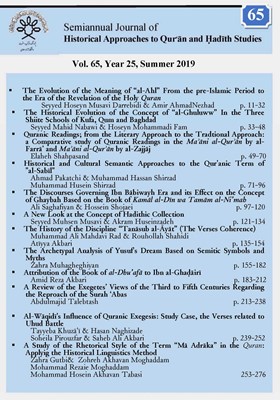A Review of the Exegetes’ Views of the Third to Fifth Centuries Regarding the Reproach of the Surah ‘Abas
Subject Areas : -'AbdolMajeed TalebTash 1 *
1 - Associated Professor in Quran and Hadith Studies, Karaj Branch, Islamic Azad University, Karaj, Iran.
Keywords: the Prophet, Frown, the Blind, Sura ‘Abas, Abdullah b. 'Um Mahktūm,
Abstract :
The opening verses of Surat al-Abbas rebuke a person who had frowned because of the presence of a blind. The ambiguity of the verse regarding the identity of the frowning person has caused the commentators to express different views. The results show that Ṭabarī, a Sunni commentator in the second century, has narrated numerous Hadith regarding the revelation of Sura Abbas and that it was about the question of Abdullah Mahktūm, a question after which the prophet (pbuh) frowned, resulting in the revelation of the verse to the Prophet. He considered these traditions to be true. Subsequently Sunni commentators have also cited and commented on the same Tabarī’s narratives as a reliable historical document. Shi'ite commentators believe in the Prophet's infallibility, so they do not regard the narrations as worthy of the Prophet's character and do not consider them correct. But there don’t narrate any Hadith about the reason such Sura was revealed. They know the dignity of the revelation about Abdullah Mahktūm, but they say that the person in question cannot be a prophet and based on a Hadith from Imam Sādiq they attribute the rebuke to someone else, someone from Banī Umayyeh or ‘Uthmān. According to an innovative opinion, the first Verse refers to the person other than the prophet who had left the meeting after the entrance of Abdullah Mahktūm, while the following verses which contain a kind of mild reproach refers to the prophet for not paying attention to the events. A reproach which would not negate his infallibility.
_||_

